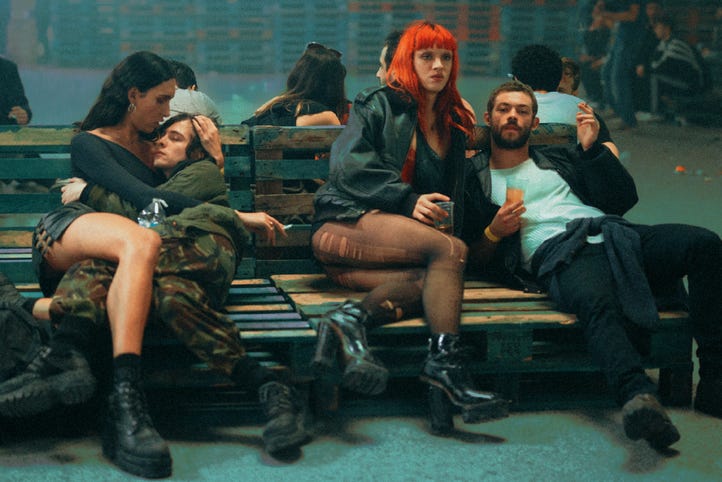Heads-up: Substack has a new feature, Notes, which is for informal, short-form posts (that doesn’t email to subscribers). We’ll probably use it to share tidbits and things that don’t quite make the newsletter for one reason or another, like this first one or this one featuring things that didn’t make this week’s “queer things we’ve been into” list.
Dustin by Naïla Guiguet. A 20-minute short from 2020, Dustin is the directorial debut of Guiguet, a French filmmaker and popular DJ. She concepted, wrote, and shot the film around the palpable techno scene and warehouse parties she’s a part of, filming during an actual party in the Parisian suburbs she had a part in organizing. Guiguet explains “I wanted to shoot this kind of parties [sic] specifically, in all their excess, sadness, melancholy, violence, pain - dirty and sweet at the same time.”1 And that she does—with beats from electronic duo KOMPROMAT (among others), the lens of Portrait cinematographer Claire Mathon, and through a character who is both beautiful and vulnerable. The protagonist Dustin is played by Guiguet’s friend, fellow DJ and actor Dustin Muchuvitz (also in The Demons of Dorothy, which we wrote about here). Guiguet says the story is inspired by an after-party experience they had together and Muchuvitz’s life experiences as a non-binary queer person. Dustin explains their gender by way of stating: “Let’s say it’s a good day when everyone calls me Miss.”
Leaving Isn’t the Hardest Thing by Lauren Hough. This incredible book of essays may have been published a couple of years ago, but this isn’t old news because Lauren’s writing is so good, it’s good any time. Heather finally had the chance to read the collection and Amie re-read a few essays this week. Lauren tells piercing personal stories and recounts experiences with frankness and without sentimentality, avoiding personal tragedy exploitation while excavating larger truths. Lauren’s voice embodies a kind of humorous anger that we consider part of the creative lesbian legacy of ‘fumerism,’ an expression originated by lesbian elder and humorist Kate Clinton—a term that Cynthia Willet and Julie Willet explain as “being funny and wanting to burn the house down all at once.”2
“I can’t tell you what it feels like to live in a constant state of alert unless you’ve lived it. We watch horror movies because they’re fun. There’s tension. The dark room. The building music. The ominous threat. Then release. A cat jumps out of the cupboard. There’s no one behind the shower curtain. But in a cult, just like in any abusive relationship, there’s no release. It’s a constant threat. That sort of prolonged terror leaves a mark. But the problem with any sort of fucked-up childhood, just like any abusive relationship: you can’t talk about it because it’s a secret. All those secrets we keep and the lies we tell to keep them rot into shame. That shame isolates us. We’re shaped by our experiences, but when we see those experiences through shame, all those experiences feel like failure.” (p. 215)
We had recommended Lauren’s writing before and we continue to appreciate her words and humanity, whether we get them in her in-progress forthcoming book or her Substack:
Dusty Gannon & Vision Video. We first met Dusty Gannon, the internet’s favorite Goth Dad and the lead singer and guitarist of Vision Video, a few years ago on IG and he’s a lovely internet f(r)iend to geek out with about things like, oh say, Angela dancing to Bauhaus in Night of the Demons. We’ve had Vision Video on repeat all week because it scratches a very specific nostalgic itch for beloved bands from our youth, like The Cure, Siouxsie and the Banshees, Joy Division, and The Smiths—at the same time they create a pop-goth-rock post-punk new wave sound that’s all their own. While Vision Video’s sound makes us feel like we’re dancing in our favorite 90s goth club, their lyrics confront the demons and ghosts that have haunted Dusty after his frontline experiences as an Afghanistan war veteran and firefighter paramedic during the acute phase of the ongoing pandemic. Dusty’s words bring imagery of gothic ghosts, graveyards, blood, end of days, graves, and haunted hours—even when it’s not explicitly stated, PTSD is Vision Video’s spectre, as in songs like “Death in a Hallway” and “Inked in Red.” We appreciate both the light and the dark in Vision Video as we miss our creepers of yore and the innocent darkness of our youth.
Heather
Ladies Lazarus by Piper J. Daniels. In reading both Ladies Lazarus and Lauren Hough’s Leaving Isn’t the Hardest Thing this week, I had the experience of two books cutting me to my core in very different ways. I’m grateful to both Hough and Daniels for skillfully demonstrating how personal pain can be transformed into a salve for public consumption. These books are great examples of how one can exorcise both their inner demons and the trauma that possesses them in a manner that attracts rather than repels. In Ladies Lazarus, Daniels speaks cannily and candidly to her own difficult experiences, including disordered eating and sexual assault, while interweaving her story with the stories of other women who left an imprint on her life (some of whom were murdered and some of whom committed suicide). When discussing her love of and connection to Sylvia Plath, Daniels writes: “To see manifested in her work that all the pain and the struggle is useful, that it comes to something, that is the single most important gift anyone has ever given me” (p. 107). Likewise, Ladies Lazarus gifts us the knowledge that our pain and struggle can certainly come to something, too.
Amie
Learn some queer sign language words with Nyle DiMarco & Chella Man. This charming short video has the gorgeous and talented Nyle and Chella teach some ASL signs for various “queer” terms. I loved learning that the ASL sign for “trans” encompasses the words “beautiful, myself, and becoming.” A second video shows more of Chella and Nyle’s conversation and is just so lovely to watch and witness their sweet connection and understanding.
https://www.semainedelacritique.com/en/articles/interview-with-the-director-naila-guiguet
Cynthia Willett and Julie Willett, ‘The Seriously Erotic Politics of Laughter: Bitches, Whores and Other Fumerists’, in Sharon Crasnow and Joanne Waugh (eds), Philosophical Feminism and Popular Culture (Lanham: Lexington Books, 2013), pp. 15–36 (quote on p. 19).





Comments in no particular order:
1. I was reminded of the series "Call My Agent" (Dix Pour Cent) on Netflix--have you checked it out yet?
2. Leaving Is the Hardest Thing--curious if you''ve listened to the Cate Blanchett-read audio version and what it adds to (or distracts from) it.
3. Wonder if you plan to/have read "Manhunt" by Gretchen Felker-Martin or "Our Wives Under the Sea" by Julia Armfield (I'm currently reading and being creeped out by this one).